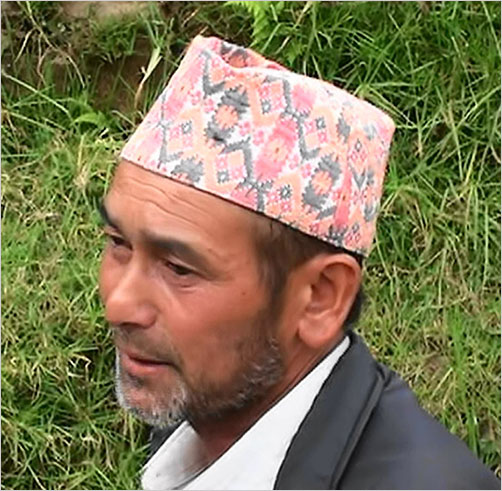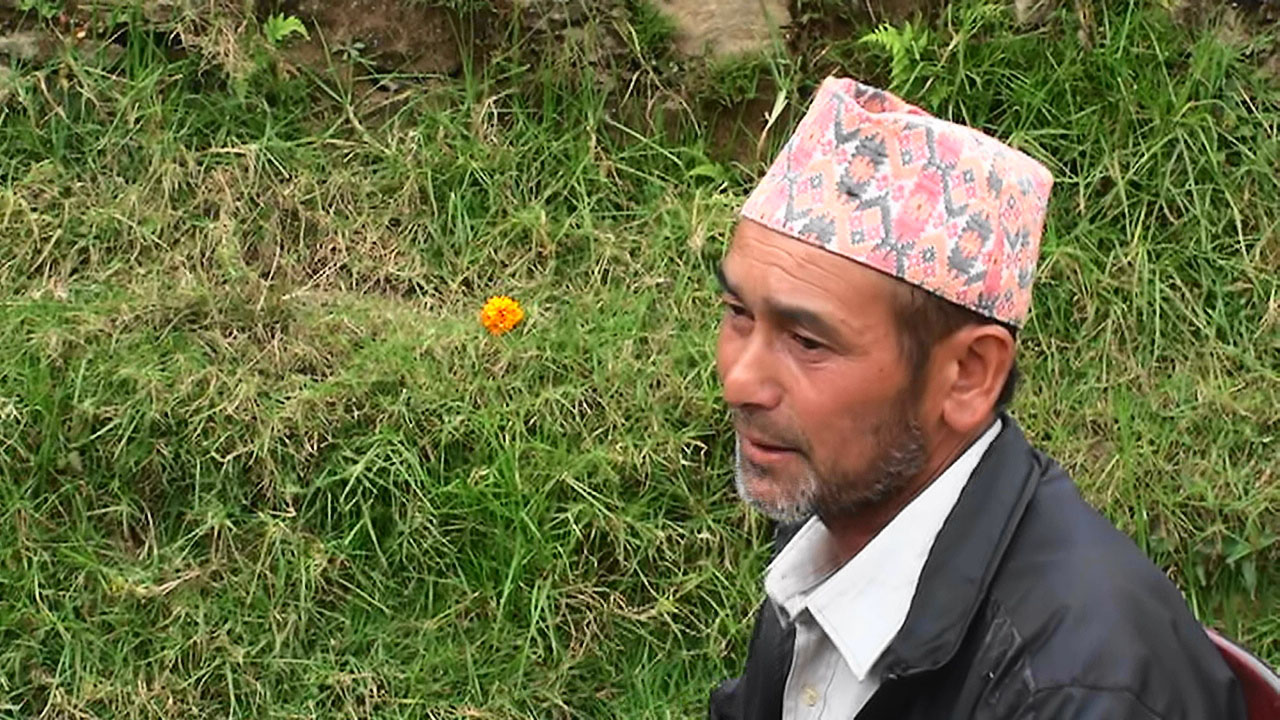Asser Man Magar is a 48-year-old man. He has three children, two of whom are adults.
He is one of the village’s important leaders, being the chairman of the Rapcha Development Committee (MIC) after having been chairman of the Basa Development Committee (VDC) and successor to Jase Rai.
He is a farmer and monitors development projects as an expert. We had met him secretly during the civil war with Raj Kumar Shresta, the headmaster of the college and Prachna Rai.
I was in my house with my wife when the first earthquake hit. It was five to midday and slightly cloudy. We had a short rest after our meal. During the second earthquake I was also at home, working with the carpenters and masons to add a floor to our old house.
Suddenly there was a big tremor. It felt like our house was collapsing. At first I didn’t understand what was happening. Then in the next second I realised it was a big earthquake. And a strange kind of fear came over me. The tremor wouldn’t stop. My wife was totally terrified too. I pulled her out of the house. As I rushed out of the house, I shouted to my neighbours to go to the square in front of Chandrodaya Primary School.
As we ran out of our house, I saw the neighbours rushing out of their houses, shouting and screaming. It was chaos.
It was Saturday and the school was closed. Soon our community gathered in the square in front of the school. People of all ages were terrified and many were screaming. After a while there was another powerful tremor and this time I saw the big hill on the other side of Tholodunga, on the Jubing side, move violently. I thought the hills on both sides were going to collapse, that everything would be destroyed and we would be swallowed up. It was frightening.
While it was happening, I kept thinking about my two children who were in Kathmandu. Maybe the telephone relay had been destroyed or maybe everyone was trying to make a phone call and saturating the traffic, but there were no mobile phones working in our area. I was desperate to find out what could have happened to them.
After a great deal of effort, we found out from the radio how many victims there had been throughout the country. Sad news of human casualties and the loss of historic monuments.
After repeated attempts I was able to speak to my son in Kathmandu; he and his younger brother were safe. It was a great relief. After half an hour, my eldest son arrived from Andheri, where he has lived with his family for several years. Everyone was safe. So nobody in our family was hurt. And I was happy about that, especially as it was the same in our village. But the death of all those compatriots in our country was really sad.
And after the strong aftershock that followed the big quake, I prayed and hoped that there wouldn’t be another one.
After shouting to my neighbours to gather in the school square, I gathered information from the villagers to find out if they were all safe and if any of them needed help.
For the next few hours, I tried to calm down the people gathered in the school square and the desperate people of Rapcha who were coming and going along Rapcha’s main road. And the more I tried to calm them down, the more the elders also tried to calm me down, given that I was in the same state as the other villagers.
Then I started to build temporary shelters with the people of the community so that we could spend the night there when there were so many aftershocks and nobody wanted to sleep in their own houses. There was a lot of tension but we tried to comfort each other to get through this difficult time.
I dismantled my newly-built plastic tunnel(to make a greenhouse) and we were able to make a very large roof to shelter us during the night. That night and for weeks afterwards, most of my neighbours and family slept under this plastic roof, built near my house in a safe place. It was our home for a month.
I was desperate to reach my children in Kathmandu. After many attempts, I was able to phone my youngest son Suraj on my mobile. I told him that we were all safe in Rapcha and asked him to go and see his sister, our daughter, who lives in a boarding house.
I also told her to ask about our other relatives and friends in Kathmandu. I advised her to stay in a safe place and to check with her sister’s school what security measures had been taken to protect the children, including our daughter, from any danger.
Before, I didn’t know the causes of an earthquake. Now I know, thanks to the radios and TV channels that gave information just after the two big tremors.
It wasn’t the first time I’d experienced an earthquake. I remember a very strong one in 1988. But it wasn’t as strong as the last two.
I remember that the elders in my village used to tell us a story about earthquakes. They said there was a huge fish deep underground. And from time to time it would shake its ears. And this movement was the cause of the tremors.
After resting in the shelter to sleep, it was the things the villagers needed immediately after the tremors that became the most important. The houses in the Tholodhunga sector were relatively less damaged, but nobody wanted to sleep in their house, fearing that another strong tremor or an aftershock would come and that they wouldn’t have time to escape in the darkness of the night.
We had heard that food in cities like Kathmandu was scarce, but this was not the case in the village. The villagers don’t have anything of great value such as money or rich jewellery, so there was no problem staying outside the houses. Our most important possessions are grains, such as millet, wheat, soya etc, which we store inside the houses. Maize is often stored outside on high ground. Many houses were damaged, but nobody took the grain outside to store it elsewhere. People seemed to have less interest in the usual things. Everyone was confused.
Gradually the sad news of the deaths and destruction of historic buildings reached us on radio and television. As we heard and observed what had happened in other parts of Nepal, we realised that our suffering was less. This gradually encouraged us to resume the normal course of our lives.
At the same time, we were saddened by the sight of the suffering in so many other regions, and our hearts went out to them, even though there was nothing we could do to help.
One thing that was really common to everyone in the village after the earthquake, whatever their age, was that they felt lost and confused. Everyone had clear signs of sadness and terror on their faces. Everyone seemed to be waiting for something terrible to happen, and this expectation imbued them with sadness. The unfounded rumours of a greater tremor made life even worse.
Yes, seeing that sadness on everyone’s face was in itself a very painful experience. It was definitely a hard time and we were shouting together to calm ourselves down.
I don’t know about the others, but my life certainly changed a lot after that big earthquake. I now know the value of family, neighbours and community. Before the earthquake I was more concerned with my own responsibilities and the activities of my business, my family or the community. But now I know that family, neighbours and community are in fact the most important things in life. You can get through the hardest times if you have the support of your family, neighbours and community; without their help and support, life becomes a real challenge, even for the simplest things.
Radio and television reports have told us that earthquakes occur in this region every few decades, and I’m afraid there will be more. I’m more afraid for my family, my neighbours and the community than for myself; I’m especially afraid for my children.
Above all, I very much hope that the villagers will soon return to their normal lives, because many of them are still very shocked. And I also hope that the Nepalese government and international aid agencies will help the population to rebuild.
Now I think the population has been given enough information about the causes of the earthquakes. At the same time, I hope that they will also be well informed about how to build earthquake-resistant houses to avoid the death and destruction of property when the earthquakes happen again.
For Rapcha we are all in favour of rebuilding earthquake-proof houses, and we are asking for this with all the families. Our area wasn’t the worst hit this time, but maybe next time it will hit us harder. That’s why we’d like to be prepared for the worst that could happen in the future.
Interview with Asser Man
Marc Béchet – November 2015



